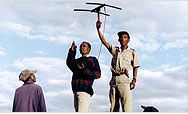Innovative Financing for Forest Conservation and the Environment:
Tropical Forest Conservation Act (TFCA)
Enterprise for the Americas Initiative (EAI)
 |
The TFCA and EAI support efforts
to conserve tropical forests. |
The Tropical Forest Conservation Act (TFCA) was enacted in 1998 to offer eligible developing countries options to relieve certain official debt owed the U.S. Government while at the same time generating funds in local currency to support tropical forest conservation activities. In addition to forest conservation and debt relief, TFCA is intended to strengthen civil society by creating local foundations to support small grants to NGOs and local communities. The program also offers a unique opportunity for public-private partnerships and the majority of TFCA agreements to date have included funds raised by U.S.-based NGOs.
TFCA is implemented through bilateral agreements with eligible countries. As of October 2006, 12 TFCA agreements have been signed, which will generate more than $135 million over the life of the agreements, plus additional investment funding and potential counterpart funding, for tropical forest conservation in 11 countries over the next 10 to 25 years: Bangladesh, Belize, Botswana, Colombia, El Salvador, Guatemala, Jamaica, Panama (two agreements), Paraguay, Peru, and the Philippines. The three most recent agreements — with Botswana, Guatemala and Paraguay — were signed in 2006.
U.S. government expenditures, totaling nearly $83 million thus far, have leveraged millions from private donors. The US expects to conclude additional TFCA agreements in the future as this successful program continues. TFCA is scheduled to be reauthorized for another three years during the 2008 legislative session. For more information, go to: www.treas.gov/offices/international-affairs/index.html.
TFCA is modeled after the successful Enterprise for the Americas Initiative (EAI) established by former President Bush in 1991 to enable Latin American and Caribbean countries that moved to open investment regimes to redirect a portion of their debt payments from the U.S. Government into a local fund to support environmental and child survival programs. The EAI program is inactive in terms of negotiation of new agreements. The last such EAI agreement was signed with the government of Peru in 1997.
How TFCA and EAI operate in General Terms
Because the TFCA is based upon the EAI, the laws creating them read very much alike. Both laws are intended to provide opportunities for eligible countries to reduce a portion of their concessional debt owed the United States while generating funds for social or environmental programs. In fact, the TFCA requires countries to meet the same political and economic eligibility criteria as the EAI and expands the Enterprise for the Americas Board established under the EAI to include agencies and private members with tropical forest expertise. Because of the similarities in their overall objectives, the benefits of the two programs are similar in terms of cash flow relief, financial leverage, debt reduction, strengthening civil society and the creation of grant making foundations.
The programs differ in geographic focus and scope. The EAI is limited to the eligible countries in Latin America and the Caribbean, but it is programmatically broader than the TFCA in that it supports a range of environmental activities, including tropical forest conservation, as well as programs in child survival and child development. The TFCA is open to eligible countries around the world but is programmatically narrower than the EAI in that it focuses on tropical forest conservation.
Both programs are ongoing, however, only the TFCA has received appropriated federal funding in recent years. Without such appropriated funding, the EAI program will not undertake new agreements.
Back to Top ^
|



